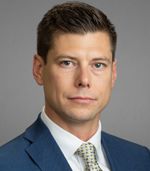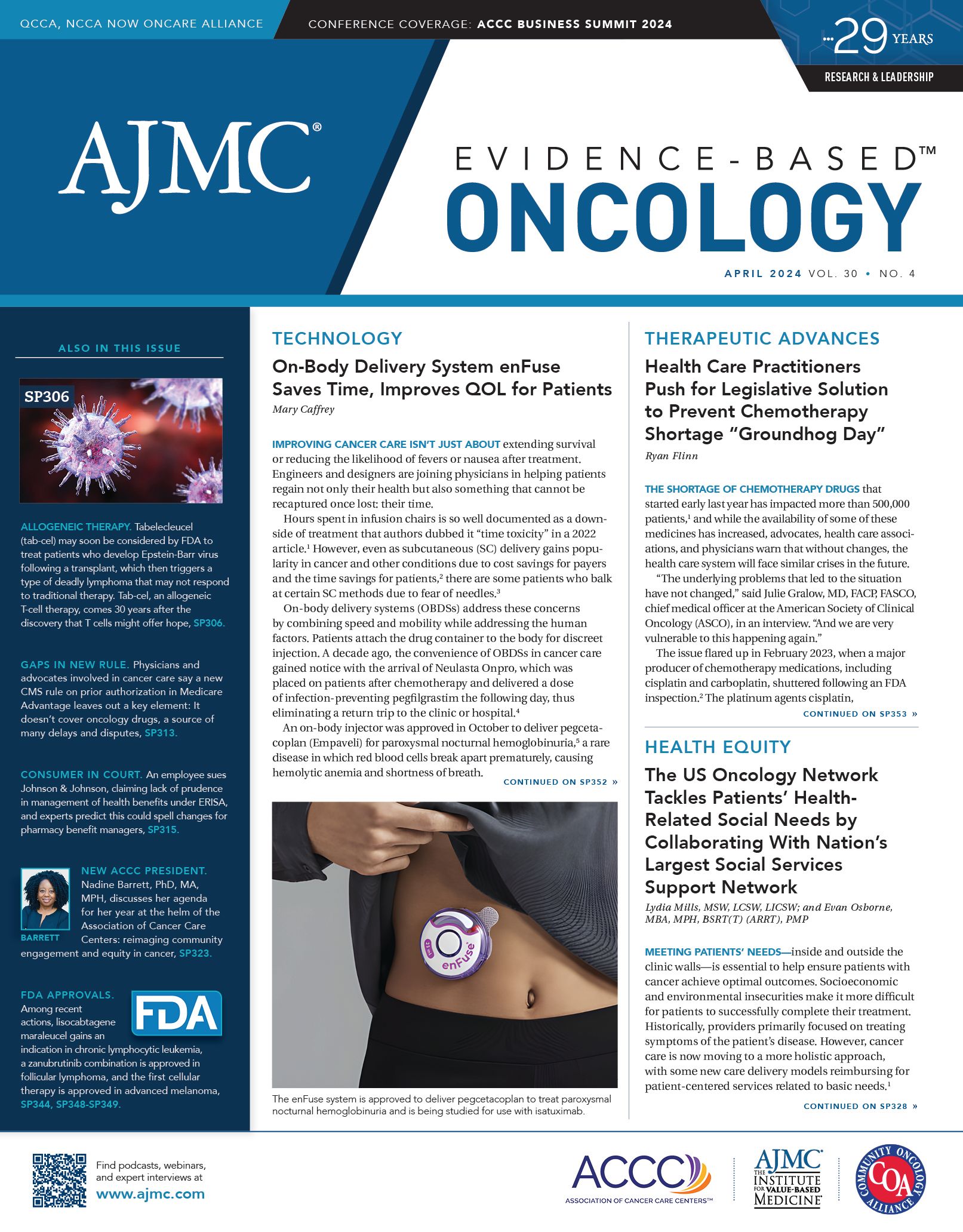
- Center on Health Equity & Access
- Clinical
- Health Care Cost
- Health Care Delivery
- Insurance
- Policy
- Technology
- Value-Based Care
The US Oncology Network Tackles Patients’ Health-Related Social Needs by Collaborating With Nation’s Largest Social Services Support Network
Meeting patients’ needs—inside and outside the clinic walls—is essential to help ensure patients with cancer achieve optimal outcomes. Socioeconomic and environmental insecurities make it more difficult for patients to successfully complete their treatment. Historically, providers primarily focused on treating symptoms of the patient’s disease. However, cancer care is now moving to a more holistic approach, with some new care delivery models reimbursing for patient-centered services related to basic needs.1
Lydia Mills, MSW, LCSW, LICSW | Image credit: The US Oncology Network

Evan Osborne, MBA, MPH, BSRT(T), (ARRT), PMP | Image credit: The US Oncology Network

The US Oncology Network (The Network) has long recognized the importance of helping patients overcome obstacles that impact their care, and many practices have social workers, navigators, and other professionals specifically dedicated to providing assistance. Now, through an exciting new collaboration with findhelp, America’s leading social services network and closed-loop referral platform, practices in The Network have access to thousands of social support programs nationwide. This alliance enables an enhanced level of assistance that efficiently connects patients to the help they need, supporting optimal outcomes for those often disadvantaged by various circumstances they face. A closer look at why it is important to help patients overcome barriers to care, as well as the unique collaboration between The Network and findhelp, may provide insight for other providers seeking ways to assist patients.
Can Meeting Patient Needs Beyond Clinic Walls Improve Outcomes?
The answer is yes. As a determinant of health, medical care is only a small component of what drives optimal results.2 In fact, clinical care is estimated to account for only 10% to 20% of the changeable factors that contribute to healthy outcomes for a population.2 The other 80% to 90% of influencing factors are often referred to as social determinants of health (SDOH).2 According to the World Health Organization, “SDOH are the conditions in which people are born, grow, live, work, and age. These circumstances are shaped by the distribution of money, power, and resources at global, national, and local levels.”2
SDOH can impact a wide range of health and quality-of-life outcomes and risks3 and play a major role in determining access and quality of medical care contributing to health-related social needs (HRSNs).2 Various HRSNs can potentially create insecurities and barriers to health care, which Kenneth G. Adler, MD, MMM, cited as “housing instability, food insecurity, transportation problems, utility help needs, interpersonal safety, financial strain, employment status, family and community support, education level, a safe accessible environment in which to exercise, and substance use.”4
When challenges arise in any of these areas, patients often have difficulty seeking care or completing their treatment. When assistance is provided to help patients overcome these obstacles, it clears the path for patients to focus on their treatment, supporting optimal outcomes and increasing access to care. Today, there is a wealth of research demonstrating that health outcomes and health equity improve when patients’ nonclinical needs are met.5,6
Even though physicians recognize that outcomes are affected by factors outside the clinic,2 they are often overwhelmed by having to meet additional needs beyond clinical care.4 In cancer care, these needs can be far-reaching and complex.
The Network Leads the Way in Addressing Patients’ Social Needs With a Unique Collaboration
To help solve the growing socioeconomic and environmental issues that patients with cancer face, The Network is collaborating with findhelp, a technology company that is modernizing the social safety net. The Network is the first health care–delivery vendor and oncology network to join forces with findhelp, empowering its member practices to act on their patients’ health-related social issues to ultimately advance health equity. Findhelp’s innovative technology provides information on more than 500,000 social support programs nationwide, enables quick referrals, and tracks progress—simplifying patient access to community resources. Being able to identify, address, and track patient needs beyond the clinic takes patient-centered cancer care to a whole new level, not only helping to improve patient outcomes but also enhancing overall well-being and quality of life.
The findhelp platform offers key features that provide important benefits to clinicians collaborating with patients in need, including the following:
- Resources are quickly identified by patient zip code.
- Clinicians can refer patients based on specific needs.
- Limited patient details are required to make a referral.
- Engagement is tracked throughout the care continuum and aggregated so it is easily visualized through a dashboard. By closing the referral loop and tracking the data, clinicians can know the patient actually received help.
It Is All About Community
The Network, comprised of community-based independent oncology practices, and findhelp are a perfect fit for collaboration, as findhelp offers a solution that enhances facilitation of community resources. The like-minded organizations share a common goal of improving access to care in local communities and advocating for fair opportunities for everyone to attain their highest level of health and well-being.
Driving the Initiative Forward by Educating, Collaborating, and Innovating
Education is extremely important on many levels in getting practices to embrace findhelp, and various strategies are being employed, from 1-on-1 discussions to network-wide forums and incentive promotions.
Education is focusing on helping staff understand HRSNs, how they impact care and outcomes, how to assess patients’ needs, and how findhelp works to connect patients to community resources. Creating top-of-mind awareness is crucial, so findhelp habitually becomes part of the conversation when a patient’s need is identified.
Nine pilot practices were initially onboarded onto the platform. Feedback was gathered, and the initiative was gradually rolled out across The Network. A promotion incentivizing adoption is now in progress. The top 3 practices that specify adoption goals through early 2024 can designate a nonaffiliated nonprofit to receive a $10,000 donation from US Oncology.
Efforts have now shifted to collaborating and sharing knowledge. By tapping into the clinic floor level experience and sharing that information, best practices can be developed and gaps in care can be identified so providers can innovate tangible solutions. From what has been learned so far, it is clear that the task of meeting patients’ needs will be ever evolving, a continual process that advances and adapts over time in accordance with changing requirements.
Reimbursement and Community Engagement Are Essential
Meeting the needs of patients outside the clinic walls may seem a bit overwhelming, but addressing these issues is extremely rewarding. Seeing the changes that occur in peoples’ lives with just a little intervention makes the effort worthwhile.
Once practices identify needs in their patient populations and establish procedures to address those issues, they ultimately must be able to sustain that process. Consequently, seeking reimbursement opportunities is crucial, as well as advocating for legislation to reimburse
elective activities. Thankfully, the industry is moving in that direction, and The Network is pleased to be at the forefront of this effort that will greatly advance cancer care. Some new reimbursement programs, such as CMS’ Enhancing Oncology Model and various commercial plans, are already reimbursing for screening and providing assistance for HRSNs.1
Once the federal government starts reimbursing for certain activities, other payers usually follow, so this progress is encouraging.
It is crucial to realize that meeting patients’ needs is a group endeavor. Individuals and practices cannot do it alone. The Network practices are harnessing resources not only from The Network but also the synergistic power that comes from community involvement. Collaborating with the community is the only way to sustain success, as it really does take a village to meet patients’ needs so they have the best chance for positive outcomes and an improved quality of life.
Author Information
Both authors are experts in The US Oncology Network. Lydia Mills, MSW, LCSW, LICSW, is senior manager of supportive care services. Evan Osborne, MBA, MPH, BSRT(T) (ARRT), PMP, is a value-based care program manager.
References
1. Enhancing oncology model. CMS. Accessed online November 27, 2023. https://www.cms.gov/priorities/innovation/innovation-models/enhancing-oncology-model
2. Magnan S. Social determinants of health 101 for health care: five plus five. National Academy of Medicine. October 9, 2017. Accessed November 28, 2023. https://nam.edu/social-determinants-of-health-101-for-health-care-five-plus-five/
3. Office of Disease Prevention and Health Promotion. Healthy people 2030: social determinants of health. HHS. Accessed November 27, 2023. https://health.gov/healthypeople/priority-areas/social-determinants-health
4. Adler KG. Screening for social determinants of health: an opportunity or unreasonable burden? Fam Pract Manag. 2018;25(3):3.
5. Patient navigation services increase cancer screening and advance health equity. HHS January 2023. Accessed November 27, 2023. https://health.gov/healthypeople/tools-action/browse-evidence-based-resources/patient-navigation-services-increase-cancer-screening-and-advance-health-equity
6. Health care access and quality: evidence-based resources. HHS. Accessed November 27, 2023. https://health.gov/healthypeople/objectives-and-data/browse-objectives/health-care-access-and-quality/evidence-based-resources

2 Commerce Drive
Cranbury, NJ 08512
AJMC®
All rights reserved.